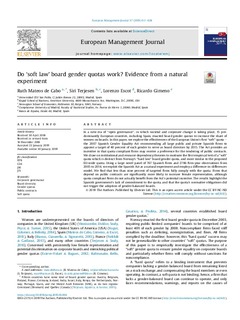| dc.contributor.author | de Cabo, Ruth Mateos | |
| dc.contributor.author | Terjesen, Siri | |
| dc.contributor.author | Escot, Lorenzo | |
| dc.contributor.author | Gimeno, Richard | |
| dc.date.accessioned | 2019-10-17T08:18:18Z | |
| dc.date.available | 2019-10-17T08:18:18Z | |
| dc.date.created | 2019-10-11T12:43:28Z | |
| dc.date.issued | 2019 | |
| dc.identifier.citation | European Management Journal. 2019, 37 611-624. | nb_NO |
| dc.identifier.issn | 0263-2373 | |
| dc.identifier.uri | http://hdl.handle.net/11250/2622706 | |
| dc.description.abstract | In a new era of “open governance”, in which societal and corporate change is taking place, 15 predominantly European countries, including Spain, enacted board gender quotas to increase the share of
women on boards. In this paper, we explore the effectiveness of the European Union’s first “soft” quota e
the 2007 Spanish Gender Equality Act recommending all large public and private Spanish firms to
appoint a target of 40 percent of each gender to serve as board directors by 2015. The Act provides an
incentive in that quota compliant firms may receive a preference for the tendering of public contracts.
We draw on institutional and resource dependency theories to motivate the first empirical test of a “soft”
quota which is distinct from Norway’s “hard law” board gender quota, and more similar to the proposed
EU-wide quota. Using a large novel panel of 767 Spanish firms and 2786 firm-year observations from
2005 to 2014, we exploit the Spanish Act as a natural experiment and employ a difference-in-differences
model. We find that less than nine percent of targeted firms fully comply with the quota. Firms that
depend on public contracts are significantly more likely to increase female representation, although
quota compliant firms do not actually benefit from the Act’s potential incentive. The results highlight the
Spanish government’s lack of commitment to the quota, and that the quota’s normative obligations did
not trigger the adoption of gender-balanced boards. | nb_NO |
| dc.language.iso | eng | nb_NO |
| dc.rights | Attribution-NonCommercial-NoDerivatives 4.0 Internasjonal | * |
| dc.rights.uri | http://creativecommons.org/licenses/by-nc-nd/4.0/deed.no | * |
| dc.subject | corporate governance | nb_NO |
| dc.subject | board diversity | nb_NO |
| dc.subject | gender quotas | nb_NO |
| dc.subject | public contracts | nb_NO |
| dc.subject | soft quota | nb_NO |
| dc.title | Do ‘soft law’ board gender quotas work? Evidence from a natural experiment | nb_NO |
| dc.type | Journal article | nb_NO |
| dc.type | Peer reviewed | nb_NO |
| dc.description.version | publishedVersion | nb_NO |
| dc.subject.nsi | VDP::Social science: 200::Economics: 210 | nb_NO |
| dc.source.pagenumber | 611-624 | nb_NO |
| dc.source.volume | 37 | nb_NO |
| dc.source.journal | European Management Journal | nb_NO |
| dc.identifier.doi | 10.1016/j.emj.2019.01.004 | |
| dc.identifier.cristin | 1736390 | |
| cristin.unitcode | 191,20,0,0 | |
| cristin.unitname | Institutt for strategi og ledelse | |
| cristin.ispublished | true | |
| cristin.fulltext | original | |
| cristin.qualitycode | 1 | |

